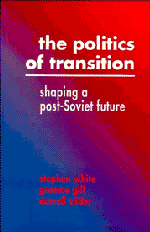
-
Select format
-
- Publisher:
- Cambridge University Press
- Publication date:
- August 2009
- August 1993
- ISBN:
- 9780511521638
- 9780521440943
- 9780521446341
- Dimensions:
- (234 x 156 mm)
- Weight & Pages:
- 0.58kg, 288 Pages
- Dimensions:
- (234 x 156 mm)
- Weight & Pages:
- 0.43kg, 288 Pages
You may already have access via personal or institutional login
Book description
The Soviet system has undergone a dramatic transformation: from communist monopoly to multiparty politics, from marxism to competing values, from centralisation to fragmentation, and from state ownership to a mixed economy. This book, by three of the West's leading scholars of Soviet and post-Soviet affairs, traces the politics of transition in the late 1980s and early 1990s from its origins to its uncertain post-communist future. The authors analyse the full impact of transition on official and popular values, central and local political institutions, the post-Soviet republics, the CPSU and the parties which replaced it, and political communication. Detailed but clearly and accessibly written, The Politics of Transition provides an ideal guide to the changes that have been taking place in the politics of the newly-independent nations that together constitute a sixth of the world's land surface.
Reviews
"...an informative, academic resource, drawing significantly on the newly vigorous Soviet press." Publishers Weekly
"The clear and concise exposition makes this volume accessible to students as well as scholars. It is an excellent introduction for any scholar unfamiliar with this period. It may be appropriate for advanced undergraduates in a course giving close attention to this period of profound change. Because each essay can stand alone, both teachers and scholars will find this volume valuable as a quick introduction, reference and refresher on each of its topics." Philip G. Roeder, Slavic Review
Contents
Metrics
Altmetric attention score
Full text views
Full text views help Loading metrics...
Loading metrics...
* Views captured on Cambridge Core between #date#. This data will be updated every 24 hours.
Usage data cannot currently be displayed.
Accessibility standard: Unknown
Why this information is here
This section outlines the accessibility features of this content - including support for screen readers, full keyboard navigation and high-contrast display options. This may not be relevant for you.
Accessibility Information
Accessibility compliance for the PDF of this book is currently unknown and may be updated in the future.


